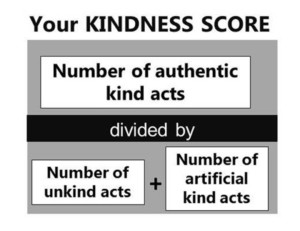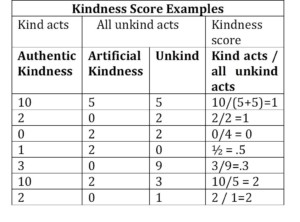The impetus for my “Live Kinder” book was because I just felt compelled to do something. There is such a lack of everyday kindness. The need for kindness hit home this week as one of my friends was impacted by an unkind act. This once again reminded me how much everyday kindness is needed in the world no matter where “your world” is located.
The unkind act toward my friend, in my analysis, involved people acting with exclusivity instead of being inclusive. They were finding ways to feed their egos instead of supporting each other. My friend had to withdraw from our activity, because as she put it, “I do not wish to spend time among those who do not even try to walk in love towards one another.”
The fundamental issue is that people think they act with kindness. If you ask the next ten people you see it they act with kindness, how many do you think would say no? Would you say yes or no? Naturally it follows then, that if we don’t see a need to change, we won’t and the cycle of unkindness will continue.
This begs the question…Why don’t people see that they are acting unkind? It’s about the lens on which they view themselves and others. In my example above, those involved in the unkind act justify being unkind because of something they perceived, which many times, was incorrect perceptions of reality, but because the lens was set to complaining and seeing only the bad. They did not want to see the good in people, because they could not see the good in themselves. It hurts when people are unkind to you. Unkindness is never justified.
Kindness is a habit. Being unkind is a bad habit that needs to be broken and replaced with a new habit of kindness. An easy way to do this is through a kindness measurement. Such a measurement takes into account your unkind acts as well as your kind acts. What I love about taking kindness measurements is that the measurements provide a gauge for all of us to be kinder people. We are all somewhere on the kindness continuum. When you know where you are, you can improve.
The kindness score is the number of times you are authentically kind divided by the number of times you are unkind or you are artificially kind that day.
The “Number of Authentically Kind Acts” is the sum of all the authentically kind acts you perform in a day.
The (Number of Unkind Acts + Number of Artificially Kind Acts) is the sum of all the artificially kind acts and the unkind acts you perform in a day. An unkind act is a deed that appears unkind, even on the surface. You do it for your own benefit, and the act is rooted in an unkind motive, such as, disrespect. It is any time you show callousness of heartlessness. An artificially kind act is a deed that appears kind on the surface, and you do for your own benefit alone or because you were coerced to do it.
Count everything authentically kind, artificially kind, or unkind you do, say or think. Be honest with yourself. Keep a small notepad close by and use a simple stick counting method to determine the total number of kind acts, as well as, the number of artificially kind acts and unkind acts. After a few days you won’t need the notepad, you will know if your net actions were kinder or unkind at the end of the day.
Calculate your score at the end of each day by dividing the total number of kind acts by the total number of unkind acts. The result is your kindness score.

This is how you would analyze your score. If your scores is
- Less than 1, you are doing more unkind acts than kind acts
- Equal to 1, you are performing as many kind acts as unkind acts
- More than 1, you are currently performing more kind acts than unkind acts.
Kindness Score Examples

So how kind are you really? What is your kindness score?
Staying in Touch: Barbara Hirsh can be reached at info@LiveKinder.com I love hearing your kindness stories. Please sign-up for a weekly kindness message at www.LiveKinder.com or follow LiveKinder on Facebook!







